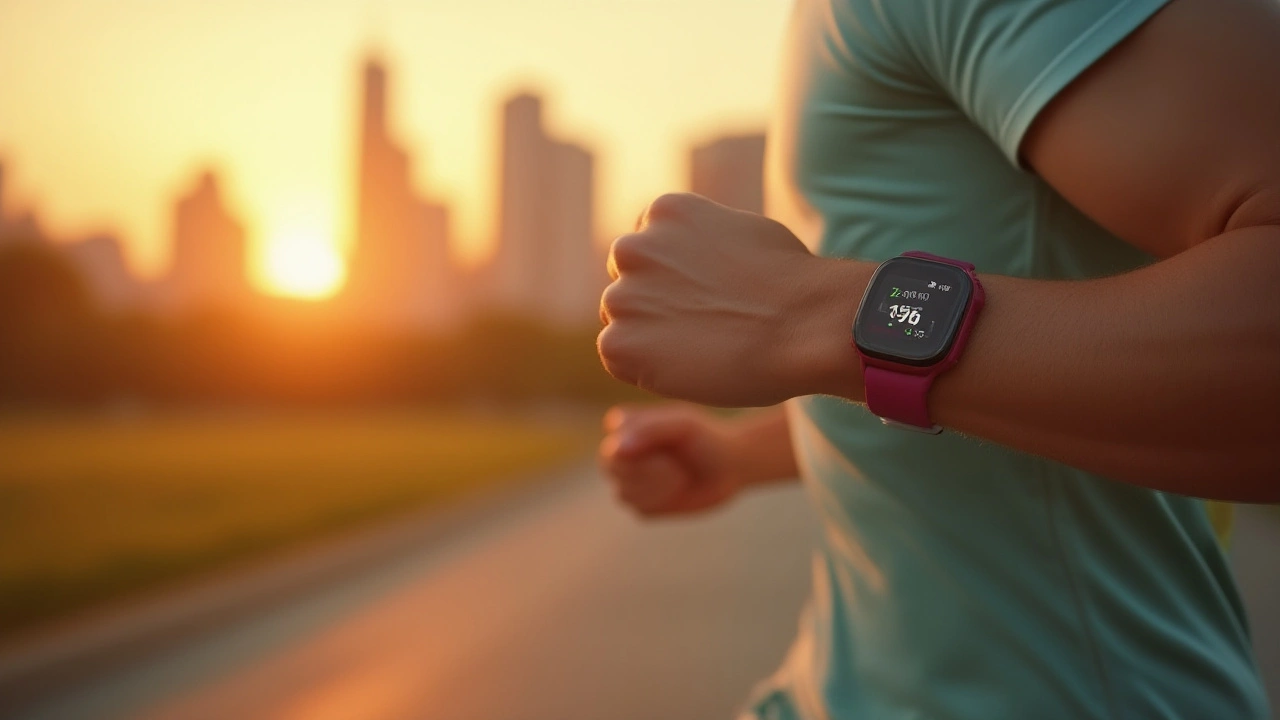
Health July 9, 2025
Athletes, Beta-Blockers, and WADA Rules: Legal Heart-Rate Control and Safe Supplements
Picture yourself seconds before a high-stakes competition, heart racing, palms sweating—not exactly the optimal state for accuracy or endurance. For some athletes, keeping those jitters in check isn’t just about staying calm; it’s about staying within the lines of what’s legal. The debate over beta-blockers in sports is intense, especially since the consequences can mean the difference between a medal and a ban. It’s not just about popping a pill—there’s a huge web of international rules, loopholes, and substitutes that shape every move on and off the field. Let’s unravel exactly what athletes need to know about beta-blockers, heart-rate strategies, and what’s actually allowed by those who police the world of sports.
WADA's Stance on Beta-Blockers: The What, Where, and Why
The World Anti-Doping Agency (WADA) keeps a hawk’s eye on the use of beta-blockers in sports. But what are beta-blockers, really? They’re medicines like propranolol or metoprolol, prescribed mostly to manage high blood pressure, anxiety, or heart problems. In certain sports, though, they offer an edge by slowing your heart rate, reducing tremors, and improving control. That’s a big deal in precision sports like shooting, archery, or even billiards.
WADA doesn’t list beta-blockers as banned across all sports. Instead, they’ve drawn clear lines: these medications are prohibited in-competition for sports where that extra calmness could swing results—think shooting, darts, and golf. Here’s an actual fact: in archery and shooting at the Olympics, beta-blockers are banned both in-competition and out of it. But if you’re a footballer or a marathon runner, the rules are different—WADA doesn’t ban them across the board.
Questions get complicated fast. What if you have a medical reason to take beta-blockers? That’s where the Therapeutic Use Exemption (TUE) process enters the mix. Athletes can sometimes get approval if their doctor confirms there’s a real medical need, but it’s strict. You’ll need to provide strong evidence and jump through some pretty tight hoops.
We’re talking about more than an honesty test, too. Testing is advanced. WADA-accredited labs can detect traces of beta-blockers in urine, and positive tests have led to athletes being stripped of titles. One famous case: an Indian shooter, Abhinav Bindra, once received a TUE for beta-blockers—but that story stands out because it’s rare. The agency’s hands-off approach in high-endurance sports is about fairness, not just health. If a medicine could give you super-steady hands, WADA wants everyone on the same starting line.
Bans can change annualy. Every year, WADA updates its prohibited list. That means what was okay last season might get you in trouble today. No athlete worth their salt skips checking the list before competition season starts. Coaches and teams regularly consult lawyers or medical staff to navigate this minefield.
The WADA website updates all rules year-round. If you want to stay in the clear, familiarize yourself with the current [Prohibited List](https://www.wada-ama.org/en/prohibited-list). Even amateur competitions sometimes follow the same codes to keep things clean.
Why Athletes Turn to Beta-Blockers—and What’s at Risk
So why do athletes even bother? The answer usually comes down to performance pressure. Picture a biathlete in below-zero conditions, trying to steady arms for the perfect shot. For athletes in low-heart-rate sports—think billiards, archery, or shooting—nerves can make or break a performance. Beta-blockers take the edge off anxiety, improve focus, and drown out that runaway heartbeat.
This probably sounds tempting, especially for anyone who’s ever wished for a little extra poise under the limelight. But the risks are very real. First, take the medical side. Beta-blockers can cause dizziness, fatigue, sexual dysfunction, and sometimes drop blood pressure too low. Training and competition aren’t exactly forgiving if you’re feeling sluggish or can’t breathe well.
Then you get to the reputational and practical risks. At international events, random drug tests aren’t so random—they’re frequent and targeted. A failed test isn’t just about missing a match. You can face multi-year bans, fines, public exposure, and—maybe the worst—losing respect from peers and fans. Just ask the athletes banned from the 2012 London Olympics for using banned heart medications.
There’s also the slippery slope of TUE abuse. WADA has cracked down on misuse after it was found some athletes sought TUEs for competitive edge rather than genuine need. In a recent study published in the British Journal of Sports Medicine (2023), over 6% of TUEs issued in precision sports involved beta-blockers—higher than in any other category. Sport organizations track these trends to spot suspicious spikes in requests.
And let’s not forget, using banned meds for an edge is a betrayal of that epic code of sportsmanship everyone talks about—because if you’re not winning fairly, is it even worth it?

Legal Heart-Rate Control: Smart Strategies Beyond Medication
If meds are out and you’re still looking for calm, athletes have been getting creative. Science backs up plenty of ‘natural’ hacks for chilling out before and during competition—no pills required. Top sports psychologists swear by a mix of breathing exercises, slow-paced meditation, and even ‘trigger word’ routines to slow heartbeats and sharpen focus. Ever noticed Olympic athletes with headphones on? That’s often not just music—it’s a mental reset button.
Here’s a standout: the “box breathing” technique. In a controlled study of elite archery athletes (Journal of Sports Science, 2022), those practicing box breathing before events saw their average heart rates drop by 10 beats per minute. Results spilled over into measured accuracy, too. Box breathing is simply inhaling for four counts, holding for four, exhaling for four, and holding again for four, then repeating.
Progressive muscle relaxation is another go-to. It’s about tensing, then relaxing big muscle groups to release tension and activate the parasympathetic nervous system. This method has roots in clinical psychology but is now mainstream on the athlete circuit.
Biofeedback is picking up steam in training rooms worldwide. With wearables connected to smart apps, athletes track their real-time heart rates, teaching themselves to dial it back through deep breathing or visualization. The feedback—a graph or alert—lets them know immediately if the technique is working. The tech isn’t banned, and teams from Germany to the US have invested in these systems. In fact, the 2024 Paris Olympics had several sports science booths touting personalized biofeedback.
If you thought caffeine was the enemy of calm, think again. Some competitors use it in micro-doses: a measured amount specifically tailored not to spike their heart rate but to keep reaction times sharp. It’s all about balance and, of course, tracking individual response since metabolism differs widely. Nutritional plans designed by certified sports dietitians focus on potassium, magnesium, and even hydration levels as part of heart-rate regulation.
Sleep is a huge factor, too. According to the American Academy of Sleep Medicine, elite athletes who get at least seven hours per night have reduced baseline heart rates and improved competition focus. And then there’s the time-tested strategy: experience. With repeated competition, stress triggers lose their edge. Veteran athletes talk about “callusing the nerves”—the more you compete under pressure, the steadier you feel.
Supplements and Alternatives: Staying Legal, Staying Competitive
If you’re hoping to sidestep beta-blockers and stay ahead, supplements might seem like the ticket. This is tricky territory. Plenty of products claim to help with calmness or heart health, but not all pass the sniff test for legality or safety.
Supplements like L-theanine (from green tea), magnesium, and omega-3 fatty acids actually do have a research-backed effect on restorative sleep, muscle relaxation, and lower blood pressure. For example, a University of Leeds 2021 study found a daily dose of L-theanine reduced performance anxiety in athletes by an average of 18%—all without any risk of a doping violation.
CBD, once controversial, is now WADA-approved—sort of. Only pure cannabidiol is permitted, while all other cannabinoids remain banned. Athletes in major leagues use CBD oils for their calming properties, but they have to be super careful about sourcing to avoid THC contamination.
Herbal remedies like valerian root or passionflower make the rounds, but most sports physicians say the evidence is thin. If you spot anything with the phrase “proprietary blend” and zero transparency about contents, steer clear—it could contain traces of banned substances like stimulants or narcotics without any warning on the label.
Here’s where it gets practical. A lot of high-performing athletes work with registered dietitians who analyze supplements batch-by-batch, checking for contaminated or mislabeled products. Certified “Informed-Sport” or NSF Certified for Sport seals are your friend. These third-party testers are recognized globally and keep you out of trouble.
Specificity matters. Not every supplement will fit every athlete’s needs, so tailored plans are important. Some individuals benefit more from magnesium, while others see heart-rate improvements through omega-3 rich diets. Routine bloodwork is suggested by sports medical staff twice a season, often timed before international events to be doubly sure nothing sneaky is lurking in the bloodstream.
If you’re looking for proven facts and lists of safe alternatives, you’ll want to explore quality guides on beta-blocker alternatives. These resources dig into the science and legality behind every option, helping you avoid accidental fouls and stay ahead health-wise. Table below shows the comparison of common supplements used for heart-rate support:
| Supplement | Main Benefit | WADA Status | Notable Research |
|---|---|---|---|
| L-theanine | Reduces anxiety | Allowed | Leeds 2021, 18% lower anxiety in athletes |
| Omega-3s | Supports heart health | Allowed | JAMA Cardiology 2020, lower resting heart rates |
| Magnesium | Muscle relaxation | Allowed | Harvard Review, 2022 |
| CBD (pure) | Calm, recovery | Allowed | WADA Update, 2019 |

Tips for Navigating Rules and Staying Ahead
If you’re an athlete, or coaching one, there’s no room for “oops, I didn’t know.” Rule changes can trip up even seasoned pros. Here’s a game plan to stay out of trouble:
- Check that year’s WADA List before every competition. Rules change—stay updated.
- Keep every prescription and supplement logged. If a doctor prescribes something, save the paperwork.
- Consult a certified sports nutritionist for safe, tailored supplement options. Don’t just Google and buy—get professional backup.
- Sign up for alerts from your sport’s governing body or get an app that tracks WADA changes in real-time. Many organizations send notifications for banned substances ahead of events.
- Practice stress-reduction routines as seriously as physical training. Breathing tools, yoga, meditation apps, all count toward stronger nerves.
- When in doubt, get a Therapeutic Use Exemption before taking any drug on the fence—never after.
- Buy supplements with NSF Certified for Sport or Informed-Sport logos, especially in unfamiliar countries or before world travel.
- Beware of “natural” pills or tinctures that sound miraculous. Many anti-anxiety herbs carry hidden risks of cross-contamination.
One more thing: be straight with your support team. That means your coach, nutritionist, even friends. Honest conversations can catch risks before they become headlines—no one wants to explain a banned substance in their blood after the fact.
This is about more than just ticking boxes. It’s about making sure your hard work pays off with a win that everyone knows was earned the right way. Technicalities matter, but so does pride.
Write a comment
Items marked with * are required.






14 Comments
McKayla Carda July 11, 2025 AT 23:08
I've seen archers use box breathing before competitions. It's wild how much it calms the nerves. No pills, no risks. Just breath in, hold, out, hold. Simple as that.
Works like magic.
Christopher Ramsbottom-Isherwood July 11, 2025 AT 23:19
So let me get this straight - you’re telling me the entire Olympic shooting community is just a bunch of anxious people who can’t handle their own heartbeats? And the solution is to ban a drug that helps them not shake like a leaf? That’s not fairness. That’s just punishing people for being human.
Stacy Reed July 12, 2025 AT 13:25
It’s funny how we moralize doping in sports while ignoring the deeper truth: we’ve turned athletes into machines that must perform flawlessly under unbearable pressure. The real violation isn’t the beta-blocker - it’s the system that demands perfection from fragile humans. We’re not policing drugs. We’re policing vulnerability.
And yet we call this justice?
Robert Gallagher July 13, 2025 AT 02:43
L-theanine is the real MVP. I used to take caffeine before matches and end up shaking like a leaf. Then I started with 200mg of L-theanine every morning. No crash. No jitters. Just calm focus. And yeah I know it’s not a magic bullet but it’s way better than risking a ban for something that’s basically a chill pill.
Also sleep. Sleep more. Seriously. You think pro athletes are just lifting weights? Nah. They’re napping like it’s their job.
Howard Lee July 13, 2025 AT 18:06
The WADA prohibited list is updated annually and publicly available. Athletes have a responsibility to stay informed. It’s not complicated. If you’re unsure, consult your sports physician or use certified supplements. There’s zero excuse for ignorance when the resources are right there.
Nicole Carpentier July 15, 2025 AT 01:46
I’ve trained with athletes from 8 different countries and every single one of them has their own ritual. Some meditate. Some listen to old hip-hop. Some just stare at the target until their heartbeat syncs with their breath.
There’s no one way. But there’s definitely a right way - the legal one.
Hadrian D'Souza July 16, 2025 AT 07:55
Oh wow. So now we’re pretending that athletes aren’t just chemically enhanced robots in spandex? Beta-blockers are banned in precision sports because they’re the last frontier of control - and WADA’s terrified that if you let one drug in, the whole house of cards collapses into a sea of pharmaceuticals and corporate sponsorships.
Meanwhile, the real doping? The 12-hour training days, the sleep deprivation, the psychological torture. That’s all legal. That’s just ‘dedication’.
Brandon Benzi July 16, 2025 AT 12:53
America doesn’t need to follow these European rules. If a guy from Texas needs a beta-blocker to steady his hand in a national shooting competition, who are you to say no? This is about freedom. Not some global bureaucracy telling us how to breathe.
Abhay Chitnis July 17, 2025 AT 19:46
Abhinav Bindra got a TUE? Bro that’s the only reason India even got a gold in shooting. If they banned it completely, we’d be back to zero medals. WADA doesn’t care about countries like ours - they care about the big leagues. Double standards much? 😒
Robert Spiece July 19, 2025 AT 16:10
You call that a ‘natural hack’? Breathing? Please. The real elite athletes aren’t meditating - they’re on IV magnesium drips, cryo chambers, and genetic optimization. The rest of you are just pretending you don’t need chemical help because you’re too proud to admit you’re not built for this.
Wake up. The game’s been rigged for decades. You’re just late to the party.
Vivian Quinones July 20, 2025 AT 01:46
I don't care if it's legal or not. If you're using something to calm down, you're cheating. Real athletes just deal with it. That's what makes them real.
Eric Pelletier July 21, 2025 AT 03:46
Biofeedback systems are the future. Real-time HRV tracking via wearables lets athletes self-regulate without pharmacology. The tech is non-invasive, non-doping, and scientifically validated. Teams like Team USA Shooting and the German Biathlon Program have integrated these into daily training protocols - and the data shows consistent improvements in shot consistency and recovery time.
It’s not magic. It’s physiology.
Marshall Pope July 21, 2025 AT 22:21
supplements with the nsf cert are the way to go. i got burned once by some random gnc stuff and ended up testing positive for a stimulant i never took. never again. now i only buy the ones with the seal. saved my career.
Nonie Rebollido July 22, 2025 AT 19:05
I used to do box breathing before exams. Didn’t know it was an athlete thing too 😅. So cool that something so simple works. Also, sleep > supplements. Always.